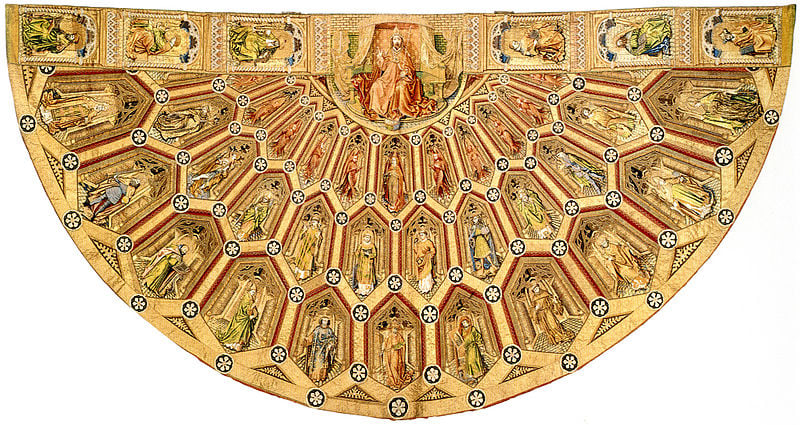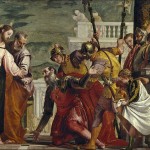Sorry for being a little polemical but if y’all know me y’all know I can’t help it.
When I played fantasy apologetical debates in my head–as one does–the other day, I was struck by the fact that many Protestant doctrines (i.e. “errors”) are in fact the result of having a human, rather than divine, understanding of time. We humans experience time one-dimensionally. But we know for a fact that time is not actually one-dimensional; and to God, certainly, it isn’t. If God is truly id quo maius nihil cogitari potest and ipsum esse existens, He transcends time.
Of course, thinking about time in a divine way is incredibly hard (impossible), since we only experience time in this limited, one-dimensional way. (A classic: “Jesus was begotten of the Father before time began.” Wait–“before” time began??) This to me highlights the necessity of receiving the Gospel within an inspired Tradition as a deposit of faith, for fear of putting our own human interpretive lenses on it without even realizing it (which is what we do when we “humanize” time).
Anyway, here are a couple points:
Predestination vs Free Will. This is the obvious one, right? (And yes, I know not all Protestants have a Calvinistic view of Predestination, but it is a Protestant view. And you know Calvinists are my (beloved) whipping boys.) How is predestination compatible with human free will? In a linear view of time, of course it’s not. But in a non-linear view of time, of course it is. Everything is predestined, but God, who experiences every moment of time simultaneously, can always “go back” (emphasis on the quotes) and take our free will into account of His predestination. (This is one thing on which Rob Bell is very good. It’s funny how (like universalism) what looks to Evangelicals like dangerous heretical innovation looks to a Catholic like a return to hallowed tradition.)
The sacrificial character of the Mass. When Protestants hear that Catholics view Mass as a sacrifice, they hear something like: “Jesus’ sacrifice on the Cross was neat and everything, but it wasn’t enough to redeem all humanity, and we still need more sacrifice to truly redeem us.” (Which, in the penal view of atonement, can even be made to say “We still need more sacrifice to appease God’s divine wrath”, which sounds downright pagan.) This is seen as radically diminishing the perfect and total nature of Christ’s sacrifice on the Cross. Now, if you’re a Catholic and you’re not in “apologetical warrior” mode, you realize that this is an aporia that you actually have to grapple with: isn’t Christ’s sacrifice enough? Again, it seems to me, the problem is a human-bound understanding of time. Christ’s sacrifice on the Cross wasn’t (or wasn’t just) a discrete moment in time. Before Christ’s sacrifice on the Cross there was brokenness, and after sin was defeated once and for all. Now there’s obviously a sense in which that is true, because God acts within history and through history (that’s the whole point of Biblical revelation, after all), but we have to understand that because God transcends human-time-bound concepts of “before” and “after” and “once and for all” that can’t be the whole story. Christ’s sacrifice on the Cross is eternal. Because God experiences every moment of time simultaneously (or “simultaneously”), for God, there isn’t a moment “before” the Cross and a moment “after” the Cross. The sacrificial character of the Mass, then, is about us sharing in this divine sacrifice, which is made possible because (through the communion of saints) Christ’s sacrifice exists for all eternity. Once you look at this from that lens, sin/redemption accounting questions about whether Christ’s sacrifice is “enough” are not just resolved, they’re completely moot.
Grace and justification. This one is a big deal. And it’s the one where it’s hardest to make the point I want to make, because there’s a lot of nuance there. And I apologize ahead of time if you feel that I am (and I might be!) strawmanning a little bit, because my beef here is more with simplistic accounts of grace and salvation, of the “perseverance of saints” and of “once saved, always saved.” Again, the problem here is to see time in this totally human way, where “before” and “after” are rigid, unmovable categories. In this account, once you are saved by grace (alone!) through faith (alone!) you are saved period forever. No need for these fancy sacraments and works and all the rest. Now again I don’t want to overdo this because there is an extent to which that’s certainly true: that as believers we receive a new birth in Christ, freed from bondage to sin. Again, God acts within history and within our understanding of time (indeed has our understanding of time through Christ). But that can’t be the whole story. To God, our lives are not a line, and God sees all of it as one coherent whole. Grace does not just happen at one specific moment in time, and neither does justification. Indeed we are saved by grace and receive a new birth in Christ, but we must also spend our lives cooperating with God’s grace at work in our lives.
Those are the ones I’ve got. Any more?












